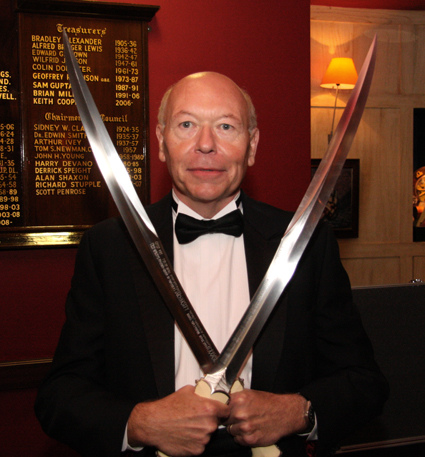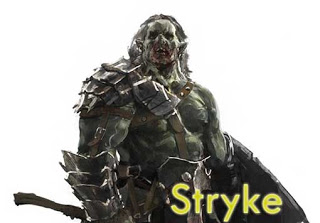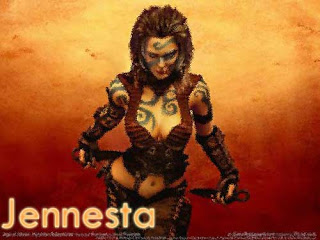Almost every user of warlandia.it knows my special love for the Horde. Orcs is my favourite race among the fantasy creatures. Some years ago I found a trilogy whose title is ORCS by Stan Nicholls. I think I’ve finally found my bible! In a few months I read the three books falling in love with Strike and his friends. Mr. Nicholls has written more than 30 books, not just ORCS. His wife writes too (fantasy books of course).
Just few days ago I asked Mr. Nicholls (http://www.stannicholls.com/) to make a short interview and he was glad to accept. I did not believe to my eyes when he wrote me back his YES. Thank God he is a very nice man. Let’s have some fun together. This article will be in english and in italian too.

Napoleonardo: How did you get the idea of writing books about orcs?
Stan Nicholls: It’s interesting that I’ve had thirty books published and only six of them, plus a graphic novel, have been about orcs. But my gravestone will probably say “He wrote about orcs”. Not that I’m complaining!
The basic idea was quite simple. My thought was “What if orcs weren’t the way we were lead to believe?” Suppose they were ferocious, peerless fighters but not actually evil? History books are usually written by the winners, and they tend to demonise the losers. Suppose this had happened to the orcs. Suppose they had a bad press, that they were the victims of a kind of character assassination. I always felt a bit sorry for orcs, maybe because I have a certain sympathy for those who don’t fit into society – like many writers. Traditionally, orcs have been depicted as mindless, savage beasts, whose only function is to be cut down by the heroes’ blades. They were one-dimensional. But what about their hopes and fears, their culture, history, customs and beliefs? I thought the orcs deserved to have these things, and tried to provide them.
Once you have the idea that orcs are your heroes the next logical step is to see humans as the villains. Turning things upside down in that way can bring interesting results. It gave me the chance to look at some of the less appealing things the human race is capable of, like blind faith, the destruction of the environment and the way outsiders are treated. The orcs books are action adventures designed to entertain, but these kind of serious concerns are there too. The fantasy genre is now mature enough, and flexible enough, to address topics like this.

Stryke is the hero of the orcs series. He is a warrior, but doesn’t like the idea of being a hero. He doesn’t like to guide his people. Can you try to explain to us more about Stryke and how he was born in your mind?
The word hero has become debased. These days it’s applied to people like footballers and contestants on TV reality shows. But it seems to me that the attributes of a hero are bravery, resourcefulness and modesty. A true hero isn’t someone who rushes into danger in a gung-ho way. I think a good definition of a hero is someone who overcomes their fear in order to do the right thing. As orcs go, Stryke’s pretty intelligent, thoughtful even; another way in which I wanted to give orcs some credit. He’s a ferocious fighter but he isn’t a fool. I suppose that I wanted to give him all the positive virtues we expect of a human hero. Whereas most of the humans the orcs encounter in my series are lacking those qualities. It’s that upside down way of looking at things again.
Stryke and his band live in a very hard world. They seem to be resigned to their condition as slaves, but something happens to break the balance and they decide to live or die but stay free. Is there any relation with your personal experience?
I could argue that it has relevance to everyone’s experience, depending on how free you think we are. Politicians don’t listen to the people, vested interests hold sway and the gap between ruled and rulers grows ever wider. Exactly how free are we? But advances in technology, particularly in giving ordinary people the means to communicate on a global scale, is exposing and undermining many of the old assumptions. So people are becoming aware that democracy is something of a sham, politics is corrupted, the mainstream media tells us lies, corporations are more powerful than governments and the financial system has proved to be smoke and mirrors, benefiting only a privileged elite.
I think one of the reasons for fantasy’s current popularity is that it allows readers to escape our increasingly complex, troubling times and visit worlds where issues are more straightforward and morality more clear-cut. Some call that the comfort factor, but I don’t see anything wrong with that. Besides which, fantasy, like the best science fiction, can help us put our reality into some kind of perspective.

Queen Jennesta eats her enemies’ hearts after having sex with them. What can you tell us about how you created Jennesta?
I very rarely base characters on real people, but Jennesta was kind of inspired by a fusion of two real people. Not that either of them wanted to rule the world or ate human hearts. Well, they didn’t want to rule the world anyway …
Jennesta’s one of my favourite characters. It’s almost always the female characters in my fiction that I like the most, and feel closest to. I’m not quite sure why that is. Maybe it’s because I was brought up in a practically all female household, and tend to think of women as being the wiser, stronger and more sensible sex! It’s certainly true that at any given time my closest friends tend to be females.
In the orcs novels the humans fight each other because of their different ideas about religion: Uni vs Mani. Stryke doesn’t understand the reasons for this war. Humans are fragile creatures but they always fight each other; they waste magic and do a lot of things he cannot understand. How much of Stan is part of Stryke?
Well, of course there’s the argument that all fictional characters contain something of the author, even if unconsciously. Writers put a bit of themselves into everything they create. It’s inevitable.
Stryke’s certainly right in thinking that human beings can be irrational and violent creatures; you only have to look at our world to see the truth in that. Again, speculative fiction is a good way of holding a lens up to the foibles and shortcomings, and the triumphs, of the human race.
Some people think that I attack religion in the books. Actually my target is extremists. I know there are good people of faith. I may not share their beliefs but I can respect the path they’ve chosen. It’s the lunatics I’m parodying.
Do you have a favourite book or a favourite author?
I don’t like to single out a particular book or author. So many have given me pleasure, and inspired me, that picking one would be unfair. Also, how would you compare, say, Robert E Howard and Kurt Vonnegut, or Fritz Leiber and Arthur C Clarke? Different authors have different styles and strengths.
How about a favourite food?
Most things spicy. And Italian dishes, of course!
Do you know Italy? Is there anything you like about our country?
On our tenth anniversary my wife and I visited Venice, which we liked a lot. It’s a fantasy island! We saw something of mainland Italy too, which we found very appealing. But it’s the only time we’ve been. Last year the organisers of the Milan Science Fiction and Fantasy Convention were kind enough to invite me to be one of their guests of honour. But it clashed with another event I’d already agreed to attend and I couldn’t go! I really regret that; I’d love to see Milan. My Italian readers seem very enthusiastic; many write to me about my books. It’d be good to meet some of them in person.
Who is Stan Nicholls in his private life?
Probably quite a boring person. Like most writers I spend a lot of time locked away with my PC, having conversations with people I’ve made up and navigating places that don’t exist except in my imagination. Fortunately my wife, Anne, is also a writer, so she understands the process, and supports me in many ways. My advice to any writer thinking of marrying or taking a partner is to chose another writer. You can share the madness.
When I’m not writing I enjoy walking, travel and visiting historical sites. And I try to master archery, something which you can easily devote your whole life to. My hope is to be reasonably good at it one day. My other obsession is my family. All we can rely on in this world is our family and our friends, if we’re fortunate enough to have them.
Is there any new book coming soon?
I’ve got several projects at various stages of development and can’t talk about them at the moment. But I can say that I’m working on a short story collection that I hope will be published in the Autumn of 2013. It’ll be mostly new stories, along with a selection of reprints. And yes, it will contain orcs stories – three new ones, including a novella of over twenty thousand words.
I’ve seen on your website that you have an audiobook of Orcs out in Germany. Will there be an Italian version?
The German audiobook is of the original trilogy, Orcs: First Blood. There are also American and English audiobooks of both First Blood and the second trilogy, Bad Blood. It’s interesting hearing how my stories are interpreted by the readers. At the moment there are no plans for an Italian audiobook, I’m afraid. But I’m open to offers!
Italian translation coming soon!!!